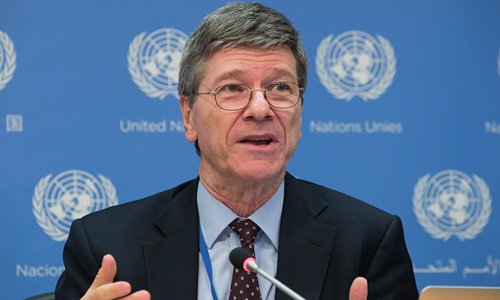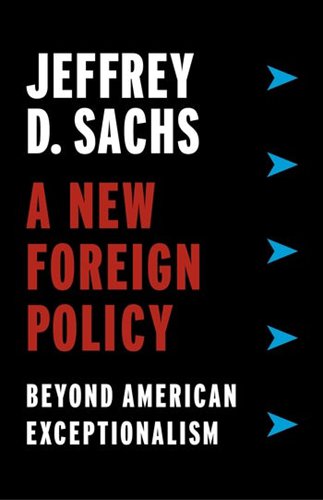HOME >> OPINION
US economist urges cooperation for stable global development
Source:Global Times Published: 2019/8/4 19:05:57

Jeffrey Sachs Photo: IC
Editor's Note:
Against the backdrop of US flip-flop during trade war consultations with China and intensifying Beijing-Washington rivalry, where China-US relations are heading and how they will affect the world have aroused concerns from scholars from both sides, including Jeffrey Sachs (Sachs), director of the Center for Sustainable Development at Columbia University. Should China be treated as an enemy? What kind of relations should China and the US strive for as two responsible major powers? Sachs shared his insights with Global Times (GT) reporter Yu Jincui on these issues and more.
GT: US President Donald Trump threatened to impose a 10 percent tariff on an additional $300 billion worth of Chinese imports Thursday, a day after the 12th round of bilateral trade talks ended. Why is the US wielding the tariff stick against China once again? How do you see the flip-flop of the US trade talks with China in the recent months?
Sachs: There are two main issues here. First, the US neoconservative foreign policy establishment is fearful of China's rise, and Trump's policy is therefore popular among hard-liners as a means to restrain China's ascent. The second issue is Trump himself. Trump is unstable and does not have the temperament required for responsible leadership.
GT: Throughout the trade war, the US has applied maximum pressure against China. In your opinion, does that work?
Sachs: This pressure will not produce any desirable results. It will hurt China, the US, and world stability. The main risk is turning both countries into enemies. This would be tragic and very, very dangerous.
GT: The US-launched trade war against China has lasted over one year. Is the US benefiting from the trade war as Trump has claimed? How has it influenced the US and Americans?
Sachs: Nobody is benefitting from this trade war. Trump thinks that China's loss is the US gain. This is Trump's primitive mentality. He believes in a zero-sum world. This view is profoundly incorrect and dangerous.
GT: You once said China is not the source of US economic problems. But it seems China is being made a scapegoat for US economic problems. Why has this happened?
Sachs: The US is afraid of China. In the late 1980s, the US was similarly afraid of Japan, even though Japan was an ally. That fear was also stupid, but it led the US to take hostile trade and exchange rate actions against Japan. The US is using a similar playbook to weaken its rivals. There is little that is new here. It's a naive and wrong-headed approach.
GT: Hard-liners are advocating treating China as an enemy, containing its development in sectors like the economy, technology and others. Where will this lead bilateral relations in the coming years? Are moderate and rational voices like yourself able to return bilateral relations to a healthy track?
Sachs: The US is prone to frenzies of paranoia. We were paranoid about Russia and that led to a prolonged and dangerous Cold War. The US has a similar paranoia about Iran. The view of China is similarly hardening in the short term. I hope that a responsible person will be elected president in 2020 to help restore a path of mature cooperation and honest negotiations over real issues.
GT: Why is the US so anxious and fearful about China's rise? With China's rise, is it an inevitable enemy for the US? Some have said it is hard for major powers to escape the Thucydides' Trap.
Sachs: Of course China is not an inevitable enemy. China and the US need to cooperate on peace, environment, and the global economy. Together, the two countries, plus the EU and the African Union and others, could do so much to improve world conditions.
GT: Some argue that a new Red Scare is reshaping in the US. What's your take on it?
Sachs: I am worried about this. There is nothing inevitable in this trajectory. But it is a risk.
GT: Looking into the future, what kind of relations do you think China and the US should try to establish as two responsible major global powers?
Sachs: I've written about the kind of world we need, one with strong regions - North America, Latin America, EU, AU, South Asia, East Asia, and ASEAN. Based on strong cooperation among neighboring countries, across regions, and the international rule of law under the UN Charter, I hope China, Japan, and South Korea can become more trusting and friendlier so East Asia can become a secure, well-functioning, highly productive region to help guide the world peacefully. I don't believe there will be or should be any single hegemonic power in the 21st century, not the US, China, or any other country. All countries should cooperate under the UN rule of law. These ideas are in my new book, A New Foreign Policy, published in February 2018 by Columbia University Press.

Photo: courtesy of Columbia University Press
GT: Will China and the US enter into prolonged confrontation? If so, how should we deal with the situation?
Sachs: Let's not prepare for confrontation. Let's insist on cooperation. That's the way to prosperity and survival.
In the meantime, I have one specific economic recommendation. China should not artificially support or defend the yuan value at 7.0 or stronger. Given the unilateral Trump trade actions, the market will tend to push the yuan weaker. To perhaps 7.5 yuan per dollar rate. The People's Bank of China should not prevent that depreciation from happening as the result of market forces. Such currency depreciation would help China shift its exports to other markets and thereby maintain output, growth, and jobs.
Newspaper headline: Frenzied paranoia has overtaken the US
Posted in: DIALOGUE